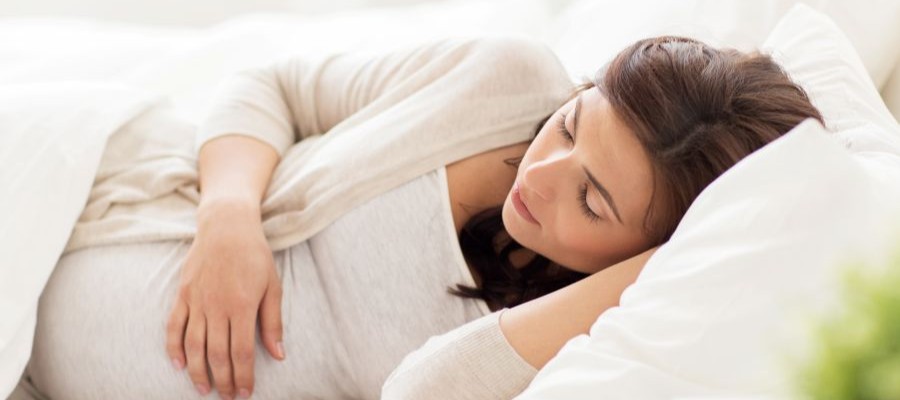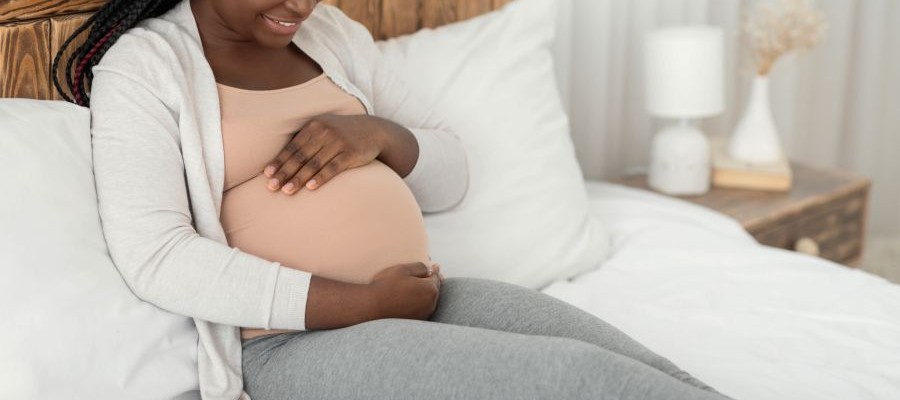
Sleeping during pregnancy
Sleep during pregnancy can be challenging, even for women who have never experienced sleep issues before getting pregnant. Throughout your pregnancy, your body and your life are changing in huge ways – hormone levels surge potentially causing a variety of side effects and you are also mentally and emotionally preparing to welcome a tiny human into your life, whether this is your first baby or your third.
It is easy for people around you to joke that the poor sleep you may experience during pregnancy is just practice for when you bring home a newborn. However, good quality sleep and enough of it is especially important while you are pregnant. In fact, a study has shown that women who got less than 6 hours of sleep per night labored longer and were 4.5 times more likely to have a cesarean delivery.
What are some sleep issues I might experience during pregnancy?
Among other discomforts during pregnancy, many women experience sleep disturbances. Fortunately, most of these are temporary and resolve on their own at some point during or after your baby is born. These may include:
- Fatigue
- Excessive daytime sleepiness
- Snoring
- Sleep apnea
- Restless leg syndrome (RLS)
- Frequent night awakenings, especially to use the restroom
- Insomnia
- Nocturnal gastroesophageal reflux (nighttime GERD)
- Feeling very hot

Sleep in your first trimester
At the beginning of your pregnancy, progesterone levels rise which can cause you to experience excessive daytime sleepiness. Aside from sleeping a lot during pregnancy, you might wake up frequently to urinate, which disrupts sleep and adds to your daytime sleepiness the following day. Rather than turning on a bright light, try using a nightlight during middle of the night awakenings so you can fall back to sleep as quickly as possible.
If you are a stomach sleeper, you may find this position suddenly uncomfortable due to sore or tender breasts. You may need to change sleeping positions to find one that is comfortable for you and your changing body.
Nausea during pregnancy, also known as morning sickness, unfortunately can strike at any time of day or night. One way to lessen morning sickness is to keep some saltines next to your bed and nibble on one or two before you get out of bed.

Sleep in your second trimester
For some women, the second trimester is the best. The hormones from the first trimester have settled down a bit, although they will rise again in the third trimester.
Sleeping on your side with your knees bent will probably be the best position as you may start to experience heartburn. As your baby grows, there is less space and your uterus may press on your stomach, causing heartburn. Elevating your head with some pillows can also relieve the heartburn – play around with different pillows and positions to find what is the most comfortable and supportive for you.
RLS during your second trimester
Another uncomfortable pregnancy symptom that may affect your sleep from the second trimester onwards are leg cramps or restless leg syndrome (RLS), which can cause crawling, pulling, itching sensations within your limbs, not on your skin. These may be more common or severe for women who are anemic or have low iron levels.
Many of the medications used to treat RLS have not been studied in depth for pregnant women so it would be important to discuss your options with your healthcare provider to weigh the potential risks and benefits. Some non-pharmaceutical options you can try include warm baths and massage, getting up and walking (although this may further disrupt sleep), keeping a moderate and regular exercise routine and avoiding caffeine.

Sleep in your third trimester
In this last stretch of pregnancy, you may experience even more frequent night awakenings, insomnia, and snoring. You may have very vivid dreams that you remember when you wake up. At this point, getting as much sleep as possible in any comfortable position is your goal.
Again, laying on your left side is recommended as it allows for the most blood flow and nutrients to reach your placenta and your baby. Avoid sleeping and laying on your back for extended periods of time as the weight of your uterus can put a lot of pressure on your spine and a major vein that carries blood between your heart and your lower body.
Even if you did not snore before your pregnancy, you may start snoring due to the weight gain and increased nasal congestion. Nasal strips or a saline rinse before bed can help clear some nasal congestion. Propping your upper body or head with an extra pillow may also help.

Frequently asked questions about sleeping during pregnancy
Here we have made a collection of some of the most frequently asked questions about sleep position during pregnancy. We hope you will find it useful.
What is the best sleeping position during pregnancy?
The best sleeping position for pregnant women is on their side, particularly their left side. Try putting a pillow between your knees and under your belly or behind your back.
Is sleeping on my right side during pregnancy okay?
Sleeping on your right side during pregnancy is fine, although sleeping on the left side is thought to have a better effect on blood flow. What matters most is that you feel comfortable. Experiment with alternating sides to find out what is best for you.
Should you be sleeping on your back during pregnancy?
Sleeping on your back during pronounced pregnancy is not recommended, as it puts strain on your spine and can cause backpain during pregnancy. When you should stop sleeping on your back during pregnancy depends on how your body develops, but you will probably find it more comfortable to sleep on your side from your second trimester onwards.
How to relieve hip pain during pregnancy while sleeping
Sleeping on your left side during pregnancy is recommended, but if you experience hip pain doing so, you can try resting a firm pillow or cushion between your legs. This will alleviate the strain on your hip and help your muscles relax. Many stores sell pillows especially designed to help pregnant women sleeping.
When should you contact your provider?
Call your provider if you have any bleeding, severe pain, fever or trouble breathing. If you have sudden or extreme swelling, call you provider right away. This can be a sign of a serious condition called preeclampsia and can happen after the 20th week of pregnancy. Other symptoms of preeclampsia can be high blood pressure and/or a severe headache.
